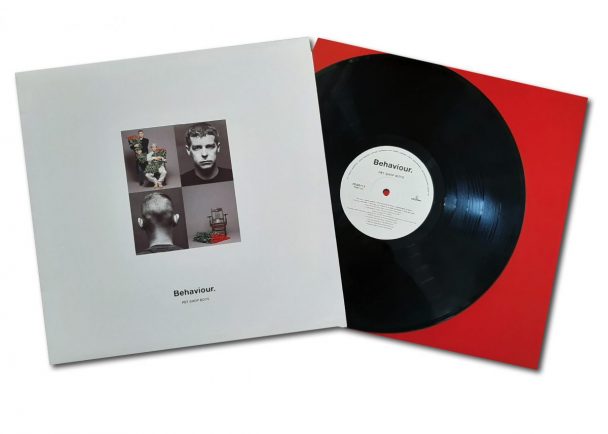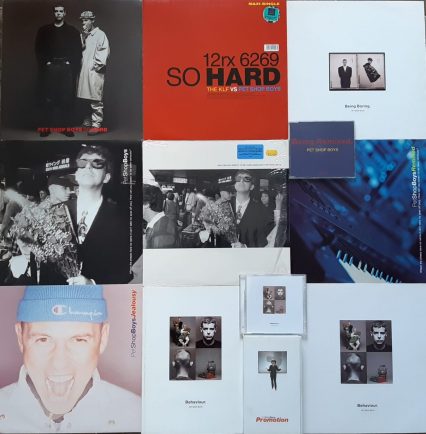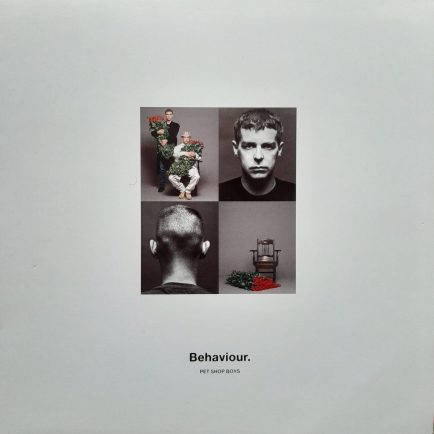IT was thirty years ago today, on October 22, 1990, that Pet Shop Boys released their fourth studio album ‘Behaviour’, recorded at the dawning of a new decade.
With its warm autumnal hues – largely thanks to the recruitment of analogue synthesizer maestro Harold Faltermeyer as producer – Neil Tennant and Chris Lowe struck on a more reflective and mature tone for this landmark release.
James Iles revisits Pet Shop Boys’ acclaimed album on its 30th anniversary.
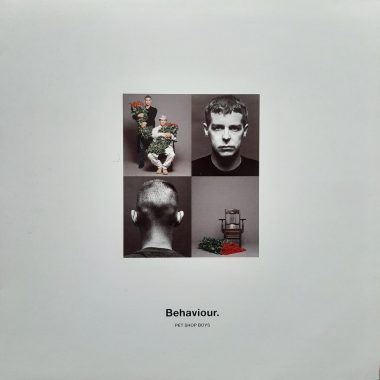 Pet Shop Boys’ Behaviour LP is 30 years old.
Pet Shop Boys’ Behaviour LP is 30 years old.1990 had seen a tumultuous start to the new decade, beginning and ending with storms on Burns Night and Christmas Day.
The world wide web was created, the Taylor Report into the Hillsborough disaster recommended all-seater football stadiums while Paul Gascoigne wept for the whole nation as England lost to Germany on penalties in the semi-finals of Italia 90.
In March, the poll tax riots dominated the headlines as Thatcher’s controversial Community Charge was about to come into force but by November, the Iron Lady – the arch-protagonist in so many Pet Shop Boys songs of the 1980s – was forced to resign as Prime Minister, being replaced by the more reserved John Major.
Madonna’s Vogue had been the big No.1 hit of the summer, ahead of her Immaculate Collection album but, perhaps more significantly for Pet Shop Boys, fellow synth group Depeche Mode had set a benchmark for their peers with their seminal album Violator, released in March.
Neil Tennant said hearing Violator steered him and Chris Lowe towards the old-school knobs and dials, and away from digital sounds.
Harold Faltermeyer – most famous for his theme tune to Beverley Hills Cop ‘Axel F’, who had also previously worked with Sparks and Giorgio Moroder – was an expert on analogue synths and therefore an obvious choice, while using one producer would give the LP more cohesion.
The trio, assisted by engineers Bob Kraushaar and Brian Reeves, began recording at Faltermeyer’s Red Deer Studios in Munich, which was fully furnished with the analogue kit they desired, and even had an abattoir on site, though thankfully this was to service Faltermeyer’s hunting passions (he made his own sausages), and not for disobedient synth pop duos!
The three began gathering together a prized collection of new compositions while finally recording some of the songs Tennant and Lowe had first written together in the early 1980s.
While its 1988 predecessor ‘Introspective’ had been an extended house mix collection of six songs, based around four of their hit singles (five if you include the PSB-penned Eighth Wonder single ‘I’m Not Scared’) and one former B-side, ‘Behaviour’ was their first ‘conventional’ LP since 1987’s ‘Actually’.
‘Actually’ had been released during a period of pop chart domination with No.1 hits like ‘It’s A Sin’, ‘Always On My Mind’ and ‘Heart’ in what has been etched into history as Tennant and Lowe’s ‘Imperial Phase’.
Between ‘Introspective’ and ‘Behaviour’ Pet Shop Boys had not stopped working though, such was their creative vigour at the time.
They co-produced and wrote most of the songs for Liza Minelli’s fantastic foray into pop music – her 1989 album ‘Results’ – as well as producing/writing half an album for Dusty Springfield, released the same year.
In the meantime they had embarked on their first ever “world” tour which took in Hong Kong, the UK and Japan, and had recorded with and written songs as a key part of Electronic with Bernard Sumner and Johnny Marr.
With the internet in its infancy, such frenetic activity with other artists sparked rumours around the school lockers that Pet Shop Boys were no more.
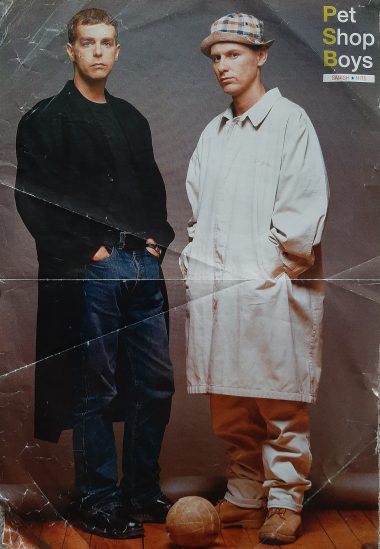 PSB in an old Smash Hits poster.
PSB in an old Smash Hits poster.Smash Hits, Select, NME and mainstream radio were our only sources of information on all pop matters back then, so I was delighted to hear the first airplay of ‘So Hard’ on Radio 1 shortly before my Year 9 class registration in September 1990, allaying those fears of a break-up.
It was a typical Pet Shop Boys song – a four on the floor house beat, high-energy bassline and those cheeky orchestra hits which they even dared to add to the verses as the song progressed, like a finger-wagging playground chant.
Then there’s the analogue brass synth melodies and warm chord sounds underpinning Tennant’s tale of the infidelities of two lovers who can’t trust themselves, let alone each other.
Tennant appeared with a cropped fringe and much shorter hair while Lowe ate an apple on the sleeve of the single which hit No.4 on the charts on a week when Maria McKee’s ‘Show Me Heaven’ was at No.1 and Londonbeat’s ‘I’ve Been Thinking About You’ sat at No.2.
Aside from the (apparently unintended) double entendre of the title ‘So Hard’, the video, directed by PSB’s late great friend from the north Eric Watson, captures a rough and raucous night out in Newcastle starring none other than Paul Gascoigne’s sister Anna in a storyline interspersed with real scenes from “the Tyne on the tiles.”
North Shields-born Tennant recalled in the 2006 TV documentary ‘A Life in Pop’ that going on a night out in Newcastle was often a terrifying experience in itself with all the ‘hard knocks’ hanging around.
The six minutes 48 seconds version of ‘Being boring’ that opens the Behaviour album (a ten minutes and 40 seconds version was released on the 12” single) was a huge statement by Tennant and Lowe.
It’s a heart-rending story that spans the 20th century, focusing on three decades that begin with the discovery of a cache of old photos in the 1920s, follow his student days, sexual liberation and a party where you had to “dress in white” in the 1970s, and conclude with the sombre fact that, because of the AIDS crisis, some of his close friends “are here and some are missing in the 1990s”.
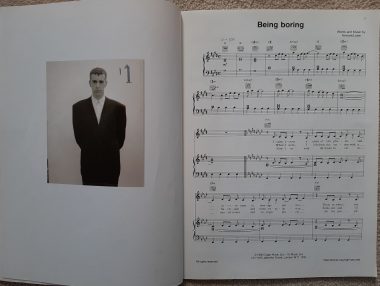 The title came from someone in Japan accusing the duo of being boring, which Neil remembered and wanted to use as the title of a song.
The title came from someone in Japan accusing the duo of being boring, which Neil remembered and wanted to use as the title of a song.
The song itself tells the story of how he and his friends set their sights on never being boring and living life like time would never come to an end, capturing his dream of becoming a pop star come true while, tragically, away from the stardom, he was visiting a close friend in hospital who was dying from what was a deadly disease in the 1980s.
With JJ Belle’s wah wah guitar and Dominic Clarke’s plastic tube embellishing the beautiful chord changes and melodies, Tennant and Lowe created a masterpiece.
However, it did not set the pop charts on fire initially (it peaked at No.20 in the UK), and only later became truly valued by a wider audience.
As Lowe himself put it: “Chart positions aren’t the be all and end all. ‘Heart’ isn’t in the same league as ‘Being boring’.”
‘This must be the place I waited years to leave’ is the fifth longest Pet Shop Boys song title and, lyrically, goes back to Catholic school for Tennant, with a song that might also have become the theme tune for James Bond movie “The Living Daylights”.
It had been intimated to Pet Shop Boys that they may be asked to write the Bond theme so the the mood of the music reflects that, even down to the twangy guitar licks (provided by Johnny Marr).
Alas, they never heard anything from the Bond movie people so Tennant wrote the scathing lyrics about his horrid time at St Cuthbert’s school, partly as a revenge for them slagging him off in the Newcastle Evening Chronicle over their hit single ‘It’s A Sin’.
Tennant is dreaming he was back in school again “and a candidate for examination” while dreading the weekly Benediction service.
‘To face the truth’ offers a more soulful bittersweet love song with lovely Rhodes piano chords played by Chris Lowe.
It is one of a few songs on ‘Behaviour’ that Tennant had started writing in the early Eighties.
He noted later that the vocal melody changes he makes in the third verse were a trick he learned off Dusty Springfield, having worked with the singing legend the year before.
I wonder if the song is one they thought about recording with her?
The lyrics deal with facing up to the uncomfortable truth of knowing a relationship is over, or even unrequited love.
“It’s about lying in bed but your lover’s somewhere else,” Tennant explained in the booklet that accompanied the 2001 reissue of the album.
‘How can you expect to be taken seriously?’ is a swing-beat swipe at the pretentious behaviour of late 1980s pop stars and all the hypocrisy of their actions, such as promoting environmental causes while jetting around the world to do so.
“You live within the headlines, so everyone can see, You’re supporting every new cause and meeting royalty,” is just one of the brilliant put downs.
The lyric about pop career longevity is referring to comments Bros made on the Wogan TV show.
A superb Brothers in Rhythm remix of ‘Seriously?’ became a double A-side with non-album track ‘Where the Streets Have No Name (I Can’t Take My Eyes Off You), which, incidentally, is the longest song title in the Pet Shop Boys’ canon.
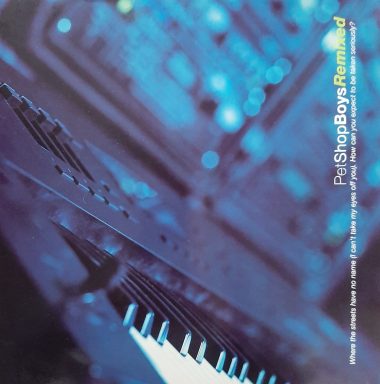 The remix 12″ of ‘Where The Streets…/Seriously…?’
The remix 12″ of ‘Where The Streets…/Seriously…?’‘Where the Streets…’ itself was a risible riposte to the machismo image of U2 at the time, mixing up their anthemic song with the Boys Town Gang’s camp disco number to hammer home the point.
The track was co-produced by Julian Mendelsohn, who also mixed ‘Behaviour’, and had previously produced PSB hits ‘Always On My Mind’ and ‘Rent’, as well as co-producing ‘It’s A Sin’ with Stephen Hague.
In what was a stormy year both meteorologically and politically, ‘Only The Wind’ blows the weather metaphor into a full-blown domestic drama with a gusty lyric Tennant was inspired to write on the spot after hearing Lowe’s melody and piano chords.
A hurricane was blowing around outside the Notting Hill studio they were working in with dustbin lids flying through the air, sparking thoughts of anger.
The story of the song became one of domestic violence, in a scenario where you turn up at a couple’s house when there’s obviously been a fight going on where the man is a wife-beater lying to cover up the incident.
“No one’s been lying, ‘cause we don’t lie anymore,” sings Tennant as the fragile-voiced narrator. Eventually the guilty party does say: “I’m sorry.”
Neil Tennant’s professed favourite track on ‘Behaviour’, ‘My October Symphony’, ambitiously – and successfully – indulges Tennant’s love of Russian history (in this instance the life of Soviet composer Shostakovich and the October Revolution of 1917) in a gorgeous song.
Perfectly pertinent to the times, Tennant assumes the role of a Russian composer who ponders whether to rewrite or revise his October Symphony following the collapse of communism.
PSB hired the Balanescu Quartet to play on this incredible pop, soul and classical crossover that again stars Johnny Marr, this time with a “wah wah” pedal plugged in. Quartet leader Alexander Balanescu even wrote the coda loosely in the style of Shostakovich.
‘Nervously’ is another one of the early compositions, having its roots in 1981, around the time Tennant began his first serious love affair.
He wrote it on an acoustic guitar before he met Lowe later that year. Lowe was able to finish off the song with the chords exactly as Tennant had envisioned them which reflects well one on what a brilliant songwriting partnership was about to begin.
Co-producer Faltermeyer had considered the song as an “LA Ballad” but the trio stuck with the minimalist electronic version you hear on the LP.
The subject matter is the nervousness at the beginning of a sexual relationship with two lovers who “much too shy to talk of love”.
The synthesizer-led track builds to a climax with layered breathing and sighing sounds for added aural pleasure.
Tennant confirms the influence of Depeche Mode’s ‘Violator’ on the penultimate track ‘The end of the world’, even mimicking the guitar sounds of ‘Enjoy The Silence’.
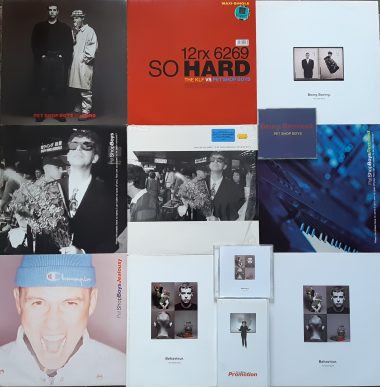 “I came across a cache of old 12″ singles, CDs and videos from the Behaviour era, circa 1990 to 1991.”
“I came across a cache of old 12″ singles, CDs and videos from the Behaviour era, circa 1990 to 1991.”Thoughts started to run to armageddon in the 90s, looking ahead to the millennium, and the song title sought to capture that.
Lyrically, it tells of a teenage tantrum with “floods of tears and doors slamming, stamping feet across the landing.”
An even bigger drama closes the ‘Behaviour’ album though, in the form of the epic orchestral ballad ‘Jealousy’, which was later released as a single with an actual orchestra on it, rather than the sampled sounds used on the LP recording.
‘Jealousy’ was the first “proper” song Tennant and Lowe wrote together, and is the one that made them think they might be on to something worth bothering with.
Lowe sat down at the piano in his parents’ house in Blackpool in 1982 and it “just came out.”
He was so pleased with it he bothered to record it on to a cassette to Tennant could hear it upon his return to London.
Impressed, Tennant set about writing the lyrics with jealousy as the theme, given the intensity of Lowe’s music.
Apparently another friend of Tennant’s (also called Chris) had been jealous of his new friendship with Chris Lowe so that inspired the tale.
“Where’ve you been? Who’ve you seen? You didn’t phone when you said you would,” are the among the endless thoughts and questions that keep the accusatory party awake.
‘Behaviour’ saw an evolution away from singles chart domination to more cohesive album formats for Pet Shop Boys.
It’s a warm autumnal record, full of perfect pop songs, with a subtle brilliance that emerges on repeated plays.
Their imperial days of No.1 singles were over but the duo changed direction purposefully, expanding their sound into more genres which laid a path for their future direction and, in turn, their own longevity.

